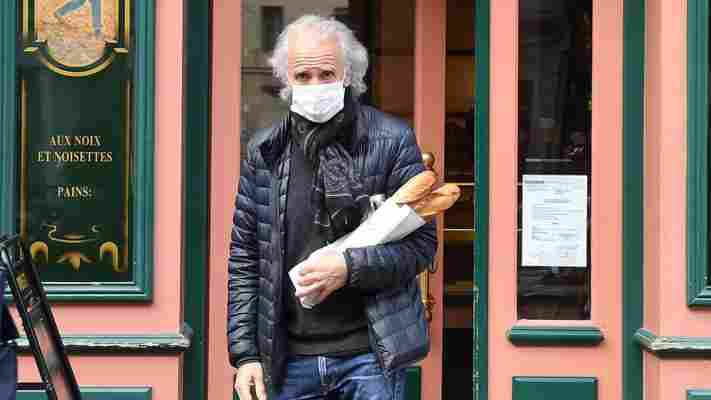Our coverage during coronavirus

While travelling is on hold due to the coronavirus outbreak, BBC Travel will continue to inform and inspire our readers who want to learn about the world as much as they want to travel there, offering stories that celebrate the people, places and cultures that make this world so wonderfully diverse and amazing.
For travel information and stories specifically related to coronavirus, please read the latest updates from our colleagues at BBC News .
It’s been said that a person’s true character is revealed in a crisis – and if the coronavirus pandemic has taught us anything so far, the same can be said for a country.
As the world increasingly bunkers in to help slow the virus’ spread, one of the most interesting phenomena taking place is the creative, quirky and inspiring ways that different cities and countries are coping with the pandemic and defining their own distinct “quarantine culture” along the way. In Italy , self-isolating residents have been filmed belting opera from their balconies. In Belgium, the nation’s iconic friteries are still doling out French fries. And throughout Scandinavia, some people are still pedalling to work on bikes.

In the past few weeks, the world has learned that a nation's culture is stronger than coronavirus (Credit: Pierre Suu)
In many ways, this global pandemic is laying bare what really matters to different nations, and in the process, revealing a lot about a country’s character. It’s also reminding us of the many people, places and cultures that make this world so wonderfully diverse.
We recently asked a few of our contributors to talk about the emerging quarantine cultures where they live.
France
What is France without its boulangeries? While the beret may have fallen out of fashion, the traditional French baguette never will – not even in a pandemic.
Following Italy’s lead, the French government here in Paris has imposed strict lockdown measures which require anyone leaving their home to produce a signed form justifying why they’re outside. It has also shuttered all “non-essential” businesses. But while supermarkets and chemists have remained running in this time of need, the official decree issued by the French Health Ministry lists some 40 exceptions that are also deemed “indispensable for the continuity of the life of the nation” – including boulangeries, butchers, wine and cheese shops and the much-beloved tabac corner stores.

France has closed all "non-essential" businesses – but kept the nation's beloved boulangeries open (Credit: Stephanie Cardinale/Getty Images)
Now, every morning from Paris to Provence, the scent of freshly baked bread wafts through France’s empty streets as some 33,000 bakeries throughout mainland France remain open. At my local boulangerie, neighbours continue their daily routine of picking up a fresh baguette, ensuring a safe social distance from one another.
According to Dominique Anract, president of the National Confederation of French Patisseries and Bakeries (CNPBF), “the baguette is emblematic of French culture.” Anract explained the vital role boulangeries play in a French person’s life. “The first place you visit as a small child is the boulangerie to buy bread. While for the elderly, the only human contact during the day is often with the local boulanger (baker).”
You may also be interested in: • Italy's inspiring response to the coronavirus • The travel 'ache' you can't translate • Your questions answered: how Covid-19 has affected travel
To Anract, the decision to keep bakeries open in a pandemic makes perfect sense. “Boulangeries are a basic necessity for feeding the French people, many of whom don’t live in close proximity to supermarkets.”
Here in Paris, wine seems to be just as valuable as hand sanitizer these days. “The French cannot consider having a good meal without drinking wine. It’s like a meal without bread,” said Thierry Givone, a French wine instructor who runs Wine Tasting In Paris . Some local wine shops have even started delivering “survival packs” of six or 12 bottles to quarantined residents.
Our newfound embrace of social distancing may interrupt the cheek-kiss practice of bises , but no pandemic will deny us of our joyful joie de vivre spirit.
- Kasia Dietz
Germany
Berlin’s nightlife is nothing short of legendary. Over the decades, clubs like Tresor and Berghain have cemented the city’s status as the holy grail for hedonists everywhere, and the world capital of techno. But with the German government recently banning meetings of more than two people , and even Chancellor Angela Merkel retreating to self-isolation, the question of where to party here on a Friday (or Tuesday, or Sunday) night has just one answer: home.
Enter United We Stream (UWS). This government-backed initiative from Berlin’s ClubCommission , an association of around 245 independent clubs and concert venues, is keeping the party alive via daily livestreamed DJ sets from the club floor as ravers self-isolate. Although we’d usually queue outside of a club at 02:00 or later here, the livestreams are held from 19:00 to midnight and viewers are also encouraged to donate to help support the quarantine-affected clubs and artists.
Berlin has been keeping the party going in the world's techno capital by livestreaming nightly concerts for quarantined ravers (Credit: John MacDougall/Getty Images)
“This UWS online party demonstrates a deep solidarity among the Berlin clubs that we are all in the same boat,” said Dimitri Hegemann, who founded Tresor in 1991.
It may be unusual to have a night in at the club, but for Berliner Kaisa Berger, the chance to listen to her favourite DJs spin while sitting on her couch in her pyjamas as her dog snoozed next to her is the best of both worlds. “I really enjoyed my ‘party’. At some point, I was even dancing around my living room,” she said. “And then at midnight, the stream ends, and you can go to sleep and wake up the next day refreshed, ready for the next virtual club visit at 19:00 again.”
Raquel Fedato, who organises the popular Berlin party Pornceptual sees UWS as a way for the community to come together. She and her partner recently livestreamed a set from Alte Münze , a club in Mitte where Pornceptual is held. “Seeing our DJ friends play again was an uplifting experience,” she said. “While it is still somewhat odd to dance in front of a screen, it took my head off the odd times we are going through."
Strange times though they are, the spirit of Berlin’s nightlife isn’t going away anytime soon – at least not while people can virtually come together. And once the pandemic is over? “In the long term I don’t know what will happen,” said Hegemann. “But I know after [Covid-19], people will take off, and the party won’t stop.”
- Krystin Arneson
India
In an effort to slow the spread of coronavirus, Indian Prime Minister Narendra Modi announced a 21-day lockdown of the world’s second-most populous country this week, ordering a nation of 1.3 billion people to stay indoors. People are still struggling to understand the ramifications of the lockdown and how to meet their essential shopping and medical needs, but in a country accustomed to bidets, so far, we have not been hoarding toilet paper.
Shortly after Modi’s announcement, India’s most famous celebrity couple – Indian cricket captain Virat Kohli and his beloved Bollywood actress wife, Anushka Sharma – took to Twitter to tell their legion of 55 million combined followers to “follow what’s been told to us and stand united.” Yet, what may be hardest for Indians these next three weeks is learning how to – literally – stand divided.
Authorities are teaching Indians how to queue at healthy social distances with chalk-drawn circles (Credit: Hindustan Times/Getty Images)
Now, we Indians may have many sterling qualities, but queuing up is not one of them. In a country with so many people, the notion of personal space is practically non-existent. And as anyone who has visited here knows, a straight line is usually a circle with dozens of strangers huddling together and shouting over each other to be heard at a shop counter.
So, amid the lockdown, supermarkets have started trying to teach Indians how to stand apart at a safe distance and proceed on a first-come-first-served basis by drawing numbered circles with chalk outside of shops. In the state of West Bengal, the Chief Minister Mamata Banerjee even paid an unplanned visit to the local market to draw circles on the road herself and explain the concept of social distancing to the masses.
Queuing isn’t the only lesson we’re learning. For the past few days, anyone making a phone call in India has had to first listen to a recorded message about the importance of covering your mouth while coughing and washing your hands. But if this viral video from the Kerala Police Department proves anything, it’s that we find the importance of hand hygiene much more delightful when it’s accompanied with an elaborately choreographed Bollywood-style song and dance.
- Charukesi Ramadurai
Britain
Even in an age of wellness booze and so-called “ nolo beer ” (no- and low-alcoholic drinks), the British pub remains as it always has been: a bastion of long-held traditions with atmosphere, ale and – of course – a lack of elbow room and social distancing. Why fix what ain’t broken? As UK Prime Minister and recent Covid-19 infectee Boris Johnson recently said, it’s an inalienable, free-born right for us Brits “to go to the pub”.
The coronavirus pandemic has put paid to all that. Boozers rang last orders on Friday 20 March and us frazzled Brits are having to be far more creative when it comes to post-work pints. But with apps like WhatsApp, Skype, Zoom and HouseParty giving us a platform to bevy and banter online with friends from St Ives to Swansea to Shetland, the age of digital drinking and the virtual happy hour has been born. One such pub, Jim the Janny’s Virtual Pub , based in Dundee, now has nearly 13,000 patrons and counting and is fine company of an evening.
Shuttered pubs in Britain have given rise to virtual happy hours and The Covid ceilidh (Credit: Clive Brunskill/Getty Images)
And so, we’ve embraced the virtual birthday party, the online stag do and on-screen pub quiz. The Lancashire-based Virtual Pub Quiz , for one, saw a world-enlarging 340,000 interested in taking part this week. Our latest digital baptism? The Covid ceilidh , a traditional Scots gathering of folk music and Highland dancing, encouraging fiddlers, bagpipe players and accordionists to strike up the band at home.
So, what are you doing this lockdown weekend? There’s still time to open your own virtual pub, or you can jig to a Flying Scotsman, Gay Gordons or Highland Barn Dance. Me? I’ll be attending my first digital happy hour Saturday night with 12 friends from across Glasgow and Edinburgh. Not needing an excuse these days, we’ll take any spirit raiser.
- Mike MacEacheran
Australia
If there is perhaps one tradition that combines Australians’ love for the outdoors, laid-back attitude and knack for surviving on an island swarming with crocodiles, sharks and deadly snakes and spiders, it’s Easter camping. Normally this time of year, hordes of Aussies would be preparing to spend the holiday weekend barbecuing around a campfire with friends and family before our cold winter settles in.
The Easter holidays may have been cancelled as the country retreats indoors , but we Australians are an inventive bunch.
More than 300,000 Aussies would normally be camping over Easter. Instead, many will pitch tents indoors. (Credit: James Bowyer/Getty Images)
This week, The Caravan Industry of Australia has started encouraging the more than 300,000 people who would otherwise be setting up camp over the Easter weekend to pitch a tent in their backyards (or living rooms) instead. Indoor campers can marvel at Australia’s wildlife via livestreams from the Lone Pine Koala Sanctuary , Melbourne Zoo and CaPTA Group Wildlife Parks in Queensland. And all Aussies can still enjoy that most iconic of Australian pastimes, backyard cricket, with Cricket Australia simulating matches and developing tips to ensure that future-world-champion Aussie kids maintain their form.
Down under, Covid-19 has largely confined many of us to our homes, but during an impromptu balcony rendition of I Still Call Australia Home we’ve been reminded by Opera Australia performers Tom Hamilton and Tomas Dalton that it’s really not a bad place to be.
- Catherine Marshall
Korea
Between its bustling night markets, round-the-clock work schedules and seemingly indefatigable smartphone culture, Seoul is an unlikely capital for a country known as the Land of the Morning Calm. But during the last several weeks, South Korea’s aggressive social distancing measures have inspired a sweet, serenity-inducing global trend: the rise of soothing online videos showing how to make Korean dalgona coffee.
Socialising in South Korea often means meeting up at a cafe, and according to Reuters , the nation actually has one of the highest densities of coffee shops per capita in the world. But with fewer people out, Koreans have instead opted to recreate our cafe culture at home by uploading tutorials of how we whip instant coffee with sugar, milk and ice to make a fluffy, peanut-butter-coloured coffee known locally as dalgona.
Dalgona coffee
According to Google Trends , this online craze started frothing higher and higher in late February. And as more people around the globe have been stuck at home making coffee themselves, more and more people around the world have been trying to whip Korean coffee themselves. There are now ASMR-style dalgona videos with 3.5 million views, a global # dalgonacoffeechallenge on Twitter and more than 64 million views for the hashtag on TikTok.
The only thing sweeter than the dalgona coffees here may be the trend of leaving handwritten thank-you notes – sometimes accompanied with small gifts – that we have been giving to our nation’s hardworking delivery workers. In Korean culture, a handwritten thank you is a deeper sign of gratitude than a verbal or emailed thank you. The Korea Times once quoted a member of a Korean linguistic association as saying, “our ancestors believed handwritten letters showed a person’s emotions.”
Of the thousands of Instagram images showing handwritten thank-you notes and prayers in Korean for delivery men and women, one of the most popular phrases so far is, “I hope there are no more victims of the coronavirus.”
- Hahna Yoon
Neighbourly love is an uplifting and emotionally engaging BBC Travel series that shows how acts of generosity can have profound effects in destinations around the world.
Join more than three million BBC Travel fans by liking us on Facebook , or follow us on Twitter and Instagram .
If you liked this story, sign up for the weekly bbc.com features newsletter called "The Essential List". A handpicked selection of stories from BBC Future, Culture, Worklife and Travel, delivered to your inbox every Friday.
